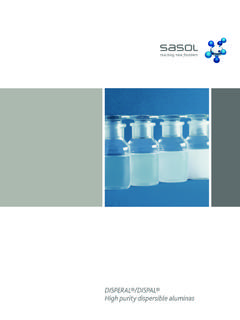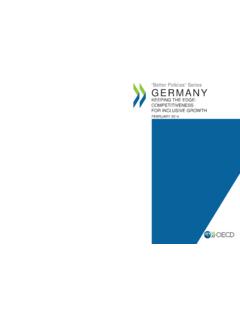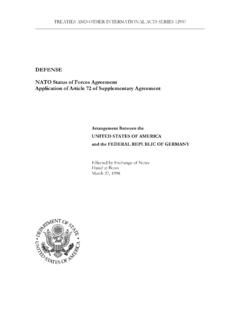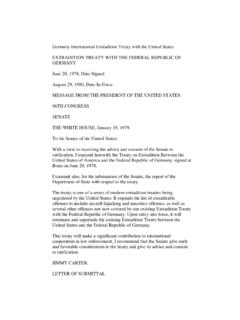Transcription of GERMANY - OECD.org
1 GERMANY . Key findings Students in GERMANY perform above the OECD average in all three domains assessed in PISA, namely science, reading and mathematics (Figures , and ). GERMANY 's mean score in science has remained stable since 2006, when science was the main domain assessed. But the country's mean score in science fell by 15 points since 2012 when science was a minor domain. The country's mean score in reading has steadily improved since PISA 2000, while its mean mathematics performance has not changed significantly since 2003. (Tables , and ). Some 11% of students in GERMANY are top performers in science 3 percentage points higher than the OECD average (Table ). As in the majority of OECD countries, a more socio-economically advantaged student in GERMANY scores more than 30 points higher in science (the equivalent of one year of schooling), on average, than a disadvantaged student (42 points in GERMANY ).
2 In GERMANY , 16% of the variation in student performance is associated with socio-economic status, which is above the OECD average (13%). However, this relationship has weakened by four percentage points in GERMANY since 2006 (Table , and Figure ). In GERMANY , not only are there fewer girls than boys performing at or above Level 5 in science, but girls even top-performing girls are also less likely than boys to expect to work in a science-related occupation (Tables and ). Student performance in science Students in GERMANY score 509 points in science, on average. This score is above the OECD. average and is comparable with that of Australia, Ireland, Korea, the Netherlands, New Zealand, Switzerland and the United Kingdom, among others (Figures and , and Table ).
3 GERMANY 's mean performance in science has remained unchanged since 2006 when science was the major domain, with an average decline of points every three years, not a significant change. But since 2012 when science was one of the minor domains, the country's mean score in science dropped a significant 15 points (Table ). Canada, Chinese Taipei and Viet Nam scored at a comparable level with GERMANY in 2012, but these countries overtook GERMANY in science performance in 2015. However, these changes GERMANY Country Note Results from PISA 2015. should be interpreted with caution, given the short time period of the comparison and since science was a minor domain in 2012 (Figure ). Moreover, since 2006, the OECD average has not shown a significant change either, while it has decreased by 8 score points since 2012; a pattern that mirrors that of GERMANY .
4 The field trial of 2014 ensured that for countries as a whole paper- and computer-delivered assessments were entirely comparable. In fact, the data does not provide any hint that German students have experienced more difficulty in responding to the computer-based test than their peers in the other participating countries. Finally, as the world approaches the fourth industrial revolution, the time to assess students with a paper-and-pencil test is probably coming to an end. On average across OECD countries, just over 20% of students do not reach the baseline level of proficiency in science, Level 2. At this level, students can draw on their knowledge of basic science content and procedures to identify an appropriate explanation, interpret data, and identify the question being addressed in a simple experiment.
5 The share of low-performing students in GERMANY is below the OECD average and has increased by only two percentage points between 2006 and 2015, not a significant change (Table ). Some 8% of students across OECD countries are top performers in science, meaning that they are proficient at Level 5 or 6. At these levels, students can creatively and autonomously apply their scientific knowledge and skills to a wide variety of situations, including unfamiliar ones. The share of top-performing students in GERMANY is above the OECD average and has not changed significantly over previous PISA cycles (Table ). Gender differences in science performance In GERMANY , boys outperform girls in science by an average of 10 points, above the OECD average. This gender gap widened by three percentage points between 2006 and 2015, which is not a significant change (Tables and ).
6 Even though gender differences in science performance tend to be small, on average, in 33 countries and economies, including GERMANY , the share of top performers in science is larger among boys than among girls (Tables ). Performance differences on the science subscales Each of the science competencies assessed in PISA requires some content knowledge (knowledge of theories, explanatory ideas, information and facts), but also an understanding of how such knowledge has been derived (procedural knowledge) and of the nature of that knowledge (epistemic knowledge). In GERMANY , students score six points higher, on average, on the content knowledge subscale than on the procedural and epistemic knowledge subscale. In neighbouring Austria, the Czech Republic and Hungary, a similar pattern is observed, while in France and the United States, students score higher on the procedural and epistemic knowledge subscale (Table ).
7 On average across OECD countries, the difference between boys' and girls' scores in science is only 4 points; but boys score 12 points higher than girls, on average, on the content knowledge . subscale. In GERMANY , the gender difference on that subscale widens to 20 score points. This may suggest that boys are relatively more interested than girls in the explanations of natural and technological phenomena that science provides (Tables and ). Across OECD countries, girls score three points higher than boys on the procedural and epistemic knowledge subscale; in GERMANY , no gender difference is observed on this subscale (Table ). 2 OECD 2016. GERMANY Country Note Results from PISA 2015. Student performance in reading Students in GERMANY score 509 points in reading, on average significantly above the OECD.
8 Average and comparable with the mean reading score in Australia, Japan, Korea, Macao (China), the Netherlands, Norway, Poland, Slovenia and Sweden (Table and Figure ). GERMANY 's mean reading performance improved from 484 points in 2000 to 497 points (about the OECD average) in 2009 and to 509 points (above the OECD average) in 2015, while no significant change was observed across OECD countries, on average, during the same period (Table ). About 20% of students in OECD countries, on average, do not attain the baseline level of proficiency in reading (Level 2), considered to be the level at which students begin to demonstrate the reading skills that will enable them to participate effectively and productively in life. In GERMANY , 16% of students perform below Level 2 in reading, below the OECD average (Table ).
9 Across OECD countries, 8% of students are top performers in reading, meaning that they are proficient at Level 5 or 6. At these levels, students can find information in texts that are unfamiliar in form or content, demonstrate detailed understanding, and infer which information is relevant to the task. They are also able to critically evaluate such texts and build hypotheses about them, drawing on specialised knowledge and accommodating concepts that may be contrary to expectations. Some 12% of students in GERMANY are top performers in reading, a larger proportion than average across OECD countries (Table ). The share of top performers in reading has grown by four percentage points since 2009 when reading was the main domain assessed (Table ). As aforementioned, these changes should be interpreted with caution, given that reading was a minor domain in 2015.
10 Gender differences in reading performance Girls tend to outperform boys in reading by an average of 21 score points (the OECD average is 27 score points). This gender gap in GERMANY narrowed by 19 score points between 2009 and 2015. (Tables and ). A similar pattern is observed on average across OECD countries, although that gender gap narrowed by only 12 points (Tables and ). In GERMANY , the share of girls attaining proficiency Level 5 or above in reading is nearly four percentage points larger than that of boys; in 2009, this gender gap was seven percentage points wide. During the same period, the OECD average difference in the shares of girls and boys attaining Level 5 or above shrank from five to three percentage points (Tables and ). Student performance in mathematics Students in GERMANY score 506 points in mathematics, on average above the OECD average and comparable with the mean score in Belgium, Denmark, Finland, Ireland, the Netherlands, Norway, Poland and Slovenia (Table and Figure ).















